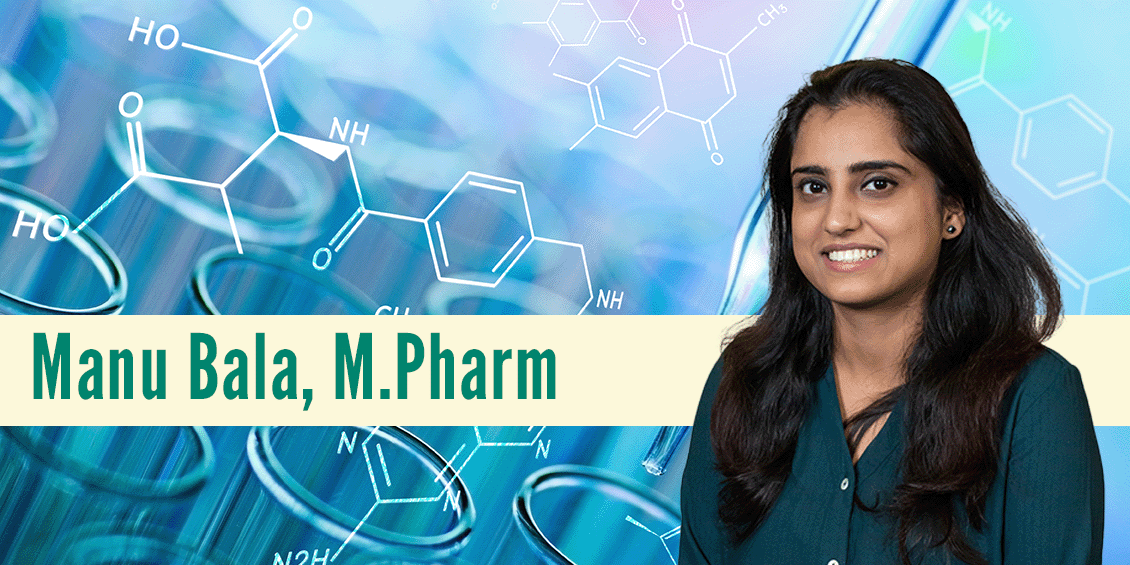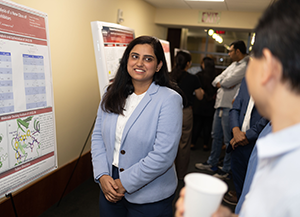
Passion, Persistence and Pharmaceuticals
Ph.D. Student’s Drug Discovery Dreams Born from Pharmacy Fascination
After taking the leap and moving to another country for higher education, Pharmaceutical Sciences - Medicinal Chemistry Concentration Ph.D. student Manu Bala owes her start in drug discovery and development to her sister but has begun to carve her own pharmaceutical path.
Course to college
Now certain of the field she wants to explore, Bala’s journey to the college was years in the making.
"I get more freedom in my work and research exposure here than what I used to get," Bala said.
Bala earned her bachelor’s and master’s degrees in India before venturing to UH. Although her entire family always supported her, Bala credits her older sister for sparking her initial interest in pharmacy and continues to serve as the driving force behind her aspirations.
"When I was in high school, my elder sister was pursuing pharmacy and she used to come back home and tell me, 'This is how the drugs work; this is how we make these medicines/drugs in the labs,'" Bala said.
Fascinated by these stories, Bala found herself drawn to the world of pharmaceuticals.
While earning her bachelor’s degree, Bala studied subjects ranging from pharmacology to pharmacognosy, but discovered her true aspirations lay with medicinal chemistry, a concentration which allows for drug discovery and structure-activity relationships.
"I thought it had really good potential to alleviate suffering or address unmet medical needs," Bala said.
During her second year working on a master’s degree in medicinal chemistry, Bala researched monoamine oxidase inhibitors, a class of antidepressant medications which are used to treat not only depression, but anxiety disorders, attention deficit hyperactivity (ADHD) and other disorders as well as some symptoms of Parkinson’s disease. This brief experience solidified her belief in the impact of research on health care.

With two degrees in hand, Bala spent a year in the pharmaceutical industry to gain a better understanding of how drug discovery works before deciding to take her experience a step further and earn her doctorate to make a broader impact in the field.
"I felt limited in my (industry) role, unable to contribute my ideas fully," Bala said.
Mentorship matters
Seeking greater opportunity in the U.S., Bala was impressed by the work of UHCOP Professor Gregory Cuny, Ph.D., on vaccines and kinase inhibitors during her search for a potential new home for research.
Cuny has been "supportive from day one," guiding Bala through the visa process and, when the COVID-19 pandemic hit, securing a deferred entrance.
"I have learned a lot from him, and I'm still learning, and I really hope that I can be a little bit like him when I graduate," Bala said.
In particular, Cuny’s work in kinase inhibitors – specifically targeting the RIPK family in inflammatory diseases and viral infections – intrigued Bala.
"Developing kinase inhibitors holds immense promise for transforming the treatment of numerous diseases as key enzymes are involved in disease processes," Bala said. "These inhibitors have the potential to provide effective and targeted therapies, significantly improving patient outcomes and advancing the field of medicine."
Receptor research
The receptor-interacting protein kinase-3 (RIPK3) is a critical mediator in the signaling pathway of necroptosis, a type of programmed cell death which is involved in neurodegenerative diseases, ischemic heart diseases and systemic inflammatory response syndrome. Through her research, Bala hopes to make an inhibitor to block this process.
Bala said the available RIPK3 inhibitors, such as dabrafenib, sorafenib and GSK’872, can produce drastic side effects due to lack of selectivity.
"They inhibit RIPK3 but also inhibit other enzymes," Bala said.
With an in-house library of kinase inhibitors available, Bala’s lab identified the compound UH 15-38 with a higher potency than currently known RIPK3 inhibitors. She is now working to optimize its structure as a lead compound.
After designing compounds through molecular docking studies, Bala synthesizes them in the lab before sending them to collaborators for biological assays.
Bala aims to develop a more selective and potent RIPK3 inhibitor with minimal side effects.
Graduation goals
Bala acknowledges the pros and cons of both academia and industry; however, she firmly believes that returning to industry will enable her to make a substantial impact on health care.
"In industry, I can work on my project with a focus and drive that allows for real-world application and innovation," Bala said. "I believe it will be easier to translate my research into tangible health care solutions and make a significant difference in patients' lives."
As she continues to learn and grow, Bala hopes to inspire others, just as her sister inspired her, to pursue their dreams and make their mark in the field of medicinal chemistry.
— by Logan Linder